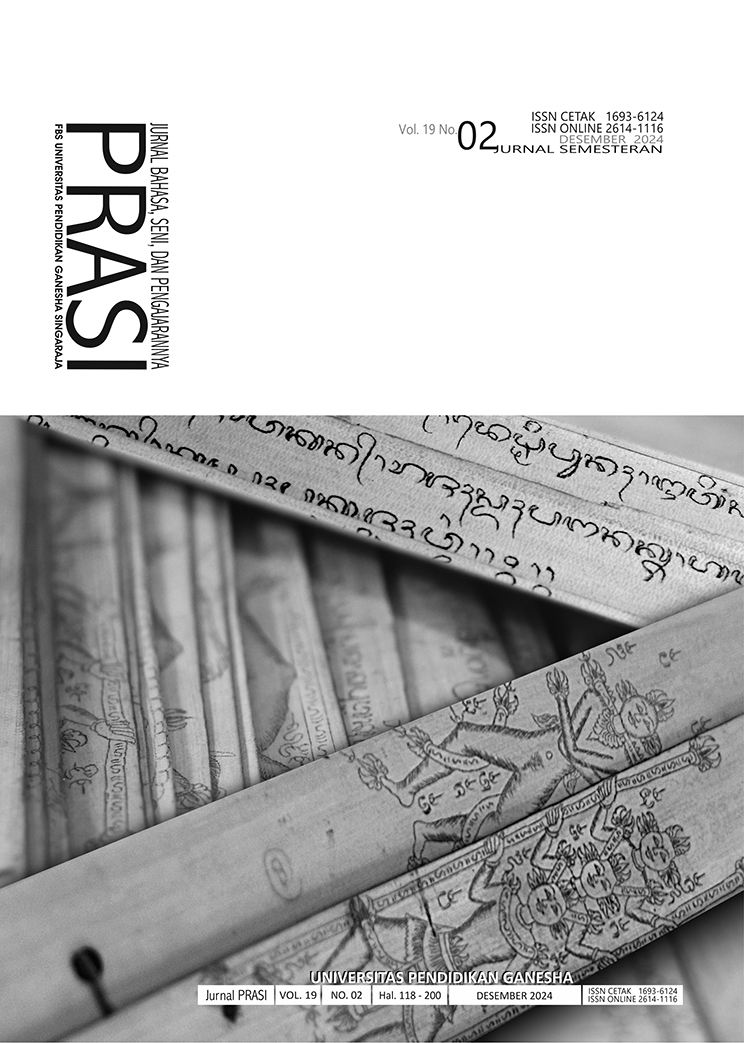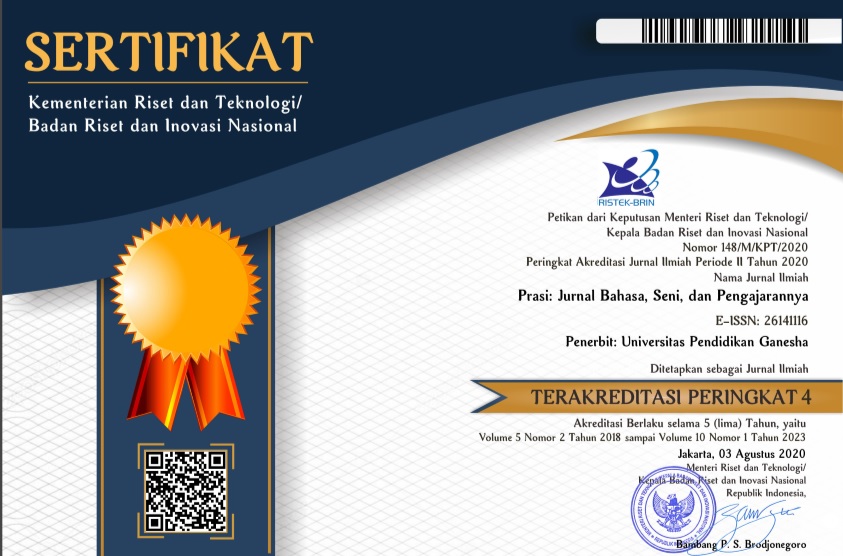THE ROLE OF EXTRAMURAL ENGLISH ACTIVITIES AMONG INDONESIAN SECONDARY SCHOOL STUDENTS: A SYSTEMATIC LITERATURE REVIEW
DOI:
https://doi.org/10.23887/prasi.v19i02.81045Keywords:
EFL, English skills development, Extramural English, performance indicators, secondary school studentsAbstract
Students in EFL countries like Indonesia are nowadays expected to have good English proficiency. Even though traditional classroom activities play an important role, it cannot be denied that learning activities outside the classroom also play a significant role. These activities, known as extramural English (EE) learning, can provide additional opportunities for language practice and exposure. This study used Systematic Literature Review (SLR) in order to examine the influence of EE towards EFL secondary school students. The PRISMA method was used to filter the articles to be reviewed, and from this, around 16 studies were selected that matched the inclusions and criteria. The results show that EE does indeed increase students' overall English language skills. Moreover, the implementation of EE can also increase students’ motivation level due to its fun, engaging, and supportive environment, which will later improve the learning outcomes obtained by students.
References
Afriyuninda, E., & Oktaviani, L. (2021). The Use of English Songs to Improve English Students’ Listening Skills. Journal of English Language Teaching and Learning, 2(2), 80–85. http://jim.teknokrat.ac.id/index.php/english-language-teaching/index
Alizadeh, M. (2016). The Impact of Motivation on English Language Learning. International Journal of Higher Education, 1(1).
Azoua, M. H. (2020). Language Clubs and Pedagogical Approach to Teach English: University of Parakou English Club Case. Lingua Didaktika: Jurnal Bahasa Dan Pembelajaran Bahasa, 14(1). https://doi.org/10.24036/ld.v14i1.107995
Coşkun, A. & Mutlu, H. T. (2017). Investigating High School Students’ Use of Extramural English: A Scale Development Study. ERIC: Online Submission, 6(1), 571–590.
Darwanto, A. B., & Sotyarini, R. (2022). Needs Analysis for Amplifying Extramural English Learning among University Students of English in Indonesia. Conscientia, 18(1).
Din, K., & Saeed, M. (2018). Relationship between University Students’ English Proficiency, Academic Achievement, and Their Satisfaction with Teacher Feedback. Bulletin of Education & Research, 40(3).
Fachriyany, A., & Murtafi’ah, B. (2024). A Survey of An Exposure to Extramural English Activities among EFL Undergraduate Students. EDULANGUE, 6(2), 167–186. https://doi.org/10.20414/edulangue.v6i2.8770
Fahik, T., & Santosa, M. H. (2021). Student’s Perception Regarding E-Learning in Pandemic Covid-19: A Case Study at Maria Bintang Laut Junior High School Art. Journal of Social Sciences and Humanities, 11(1).
Frimaulia, S., & Azmi, R. A. (2023). The Effect of English Fun Camp Program in Public Speaking of STKIP Al Maksum Students’. The SEALL JOURNAL: The STKIP Al Maksum English Education Linguistics and Literature Journal, 4(1), 61–67. https://jurnal.stkipalmaksum.ac.id/index.php/jellas
Ghenghesh, P. (2015). The Relationship Between English Language Proficiency and Academic Performance of University Students—Should Academic Institutions Really Be Concerned? International Journal of Applied Linguistics and English Literature, 4(2). https://doi.org/10.7575/aiac.ijalel.v.4n.2p.91
Harjanto, I. (2021). The Preference for English in Digital Media among Indonesian Millennials. Beyond Words, 9(1), 16–36. https://doi.org/10.33508/bw.v9i1.3143
Hentasmaka, D., Anjarwati, R., & Ni’amah, A. (2022). The Use of Smartphones as Extramural English Learning to Enrich EFL Learners’ Vocabulary. JEELL (Journal of English Education, Linguistics, and Literature) English Department of STKIP PGRI Jombang, 8(2), 178. https://doi.org/10.32682/jeell.v8i2.2179
Ivaniushina, V. A. & Zapletina, O. O. (2015). Participation in extracurricular activities and development of personal and interpersonal skills in adolescents. Journal of Siberian Federal University. Humanities & Social Sciences, 8(11), 2408–2420. https://doi.org/10.17516/1997-1370-2015-8-11-2408-2420
Komarudin, K., Zulaikah, Z., & Kuspiyah, H. R. (2019). The Effect of Public Speaking Program for Students at Nurussalam Islamic Modern Boarding School. Channing: Journal of English Language Education and Literature, 4(2), 61–69. https://doi.org/10.30599/channing.v4i2.749
Kusuma, I. P. I., Wahyuni, L. G. E., Roni, M., & Hashim, H. U. (2024). How Can Social Media Revolutionize Informal English Learning? Unveiling learning goals, advantages, and disadvantages. LLT Journal: A Journal on Language and Language Teaching, 27(1), 389–405. https://doi.org/10.24071/llt.v27i1.8232
Manan, N. A. (2018). Commitment, Community, and Bravery: The Core Activities in Endorsing Speaking Skill by English Camp Program. English Review: Journal of English Education, 6(2). https://doi.org/10.25134/erjee.v6i2.1255
Maristy, H. S. (2023). Extramural English as a New Reality in ELT: A PRISMA Systematic Review. LingTera, 10(1), 76–86. https://doi.org/10.21831/lt.v10i1.59882
Mustofa, A. Y., & Indah, R. N. (2023). Eliminating Challenges and Promoting Autonomy: The Power of the English Club for High School Students. PANYONARA: Journal of English Education, 5(2). https://doi.org/10.19105/panyonara.v5i2.9230
Ngadimun, Purwanti, R., Suriansyah, A., & Maimunah. (2019). Empowerment of “English Club” to Influence Students Achievement in Speaking. International Journal of Innovation, Creativity, and Change. www.ijicc.net (Vol. 5, Issue 5). www.ijicc.net
Novan, B., & Prabowo, E. (2020). The Implementation of an English Speaking Club in Junior High School to Enhance the Students’ Speaking Ability.
Nurhasela, Marleni, L., & Asilestar, P. (2023). An Analysis on Students’ Listening Activities as Extramural English. Print) Journal of English Language and Education, 8, 2023. https://doi.org/10.31004/jele.v8i2.416
Octaberlina, L. R., & Muslimin, A. I. (2022). Fostering Students’ Speaking Ability Through English Club Activities. Arab World English Journal, 13(3), 414–428. https://doi.org/10.24093/awej/vol13no3.27
Rahmiani, N., & Malena, N. M. (2020). The Model of Students English Club Contribution to Writing Motivation and Punctuation Awareness Improvement. Journal of English Educational Study (JEES), 3(1), 71–80.
Renandya, W. A., Hamied, F. A., & Joko, N. (2018). English Language Proficiency in Indonesia: Issues and Prospects. The Journal of AsiaTEFL, 15(3), 618–629. https://doi.org/10.18823/asiatefl.2018.15.3.4.618
Rifai, I., Esmerawati, A. B., Rusiana, R., Paradita, L. I., Anandari, C. L., & Pattiwael, A. S. (2023). Fostering the Love of Reading: Dynamics and Sustainability of Book Clubs in Indonesian Universities. Lingua Cultura, 17(1), 85–91. https://doi.org/10.21512/lc.v17i1.9735
Riyadini, M. V. (2021). English Foreign Language Students’ Perceptions Of An Online English Speaking Club in Higher Education. Advances in Social Science, Education, and Humanities Research, 197–202.
Rusiana, Nuraeningsih, & Hery Santosa, M. (2024). Students’ Perception on Extensive Reading (ER) Through Virtual Book Club to Promote A Pleasure Reading. Kasetsart Journal of Social Sciences, 45(1), 503–512. https://doi.org/10.34044/j.kjss.2024.45.2.16
Salsabila, A., & Muamaroh, R. (2023). English Club Activities in Vocational High School 3 Jepara: A Qualitative Descriptive Study.
Santosa, M. H. (2020). A Study Of Indonesian High School Students’ Perception on The Use Of Instagram as English Instructional Media. Humanising Language Teaching, 22(4).
Simbolon, H., Tampubolon, S., & Pasaribu, A. (2023). The Effect of Taking English Club Extracurricular Activities on Student’s Writing and Speaking Ability. IDEAS: Journal on English Language Teaching and Learning, Linguistics and Literature, 11(1), 1–12. https://doi.org/10.24256/ideas.v11i1.3258
Sundqvist, P. (2009). Extramural English Matters: Out-of-School English and Its Impact on Swedish Ninth Graders’ Oral Proficiency and Vocabulary. Faculty of Arts and Education, English, Karlstads University.
Sundqvist, P., & Sylvén, L. K. (2016). Extramural English in Teaching and Learning. Palgrave Macmillan, UK. https://doi.org/10.1057/978-1-137-46048-6
Swatitis, B. B. (2020). Indonesian EFL Community-Based English Club and Its Contribution to Autonomous Reading Behavior. RETAIN, 8(3), 96-107. https://ejournal.unesa.ac.id/index.php/retain/article/view/33356/30828
Waluyo, B., & Panmei, B. (2021). English Proficiency and Academic Achievement: Can Students’ Grades in English Courses Predict Their Academic Achievement? Mextesol Journal, 45(4).
Downloads
Published
Issue
Section
License
Copyright (c) 2024 Kadek Aditya Mahendra, Hery

This work is licensed under a Creative Commons Attribution-ShareAlike 4.0 International License.
Authors who publish with Prasi agree to the following terms:- Authors retain copyright and grant the journal the right of first publication with the work simultaneously licensed under a Creative Commons Attribution License (CC BY-SA 4.0) that allows others to share the work with an acknowledgment of the work's authorship and initial publication in this journal
- Authors are able to enter into separate, additional contractual arrangements for the non-exclusive distribution of the journal's published version of the work (e.g., post it to an institutional repository or publish it in a book), with an acknowledgment of its initial publication in this journal.
- Authors are permitted and encouraged to post their work online (e.g., in institutional repositories or on their website) prior to and during the submission process, as it can lead to productive exchanges, as well as earlier and greater citation of published work. (See The Effect of Open Access)


.png)
.png)









